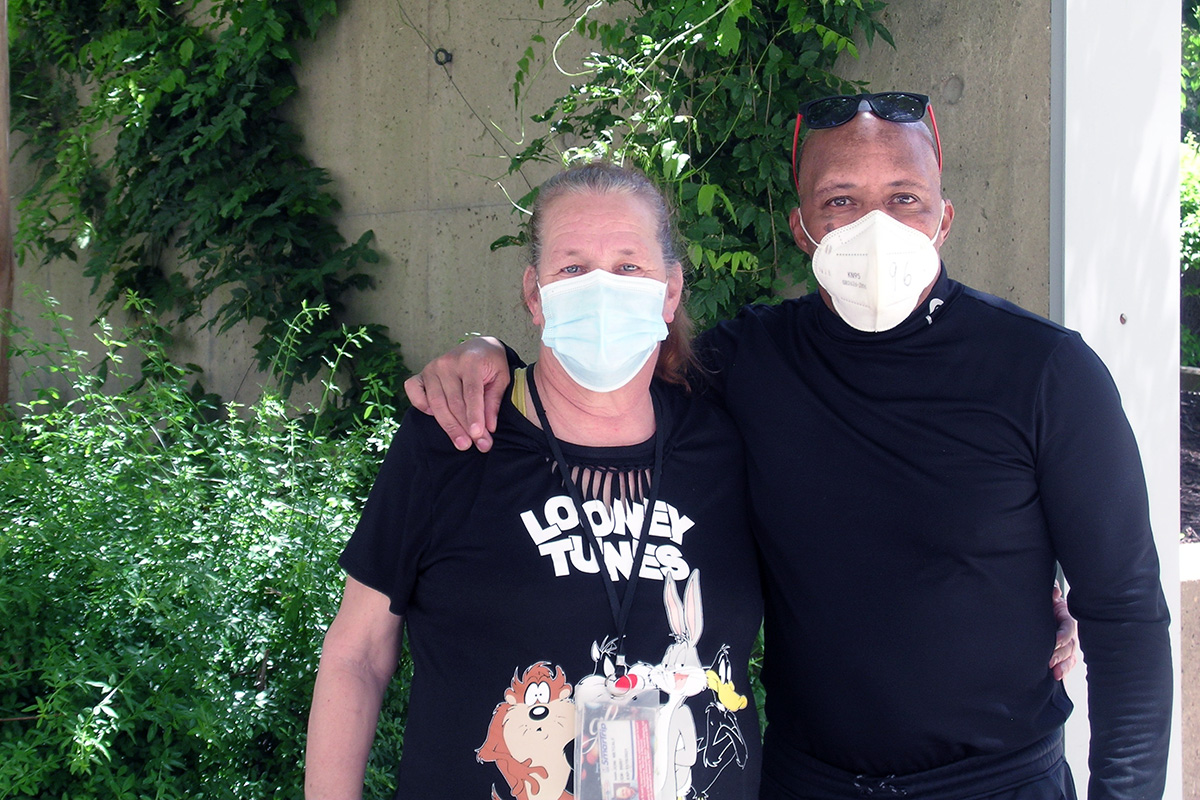When Joni and Derek Metcalf first met in the early 1980s in Temple Hills, Maryland, “it was love at first sight.” It was an observation they each made simultaneously when I interviewed them in late May. I knew that they were no longer experiencing homelessness but previously had been living on the streets for more than twenty-five years. As it so happened, the place where the interview took place in Southwest Washington, D.C., was just one hundred yards from one of the secluded outdoor places they had once called home.
Joni, fifty-seven, and Derek, sixty, married in August 1983 and raised four children, including one set of twins. Derek lost his job with the federal government during “a Reagan-era reduction in force,” and tried “various jobs: delivering pizza, delivering newspapers, security officer, and special police officer,” but could not make ends meet. Leaving their children with Derek’s mother, Joni and Derek ended up sleeping in their car, and then eventually in the streets.
“We experienced a lot of things—not just homelessness, but also racism, as an interracial couple,” Derek continued. “It is sad in our country.”
Not long ago, Joni and Derek found permanent housing near Sibley Hospital, but they will never forget what it was like to be part of the homeless community in Washington, D.C., for so many years. “Homeless people are human people,” Derek explained. “I don’t care what happened, how they got that way. Mine was loss of job, loss of home.”

Joni agreed, “A homeless person is a human being just like everybody else is.” She would like passersby to greet someone who is homeless by saying something like, “Good morning. How are you? Are you okay?” In Joni’s case, passersby “don’t know what [my] circumstances are. I am disabled. I can’t work. So I come out and do what I have to do, to try to survive, to get what I need in my home, which I just moved into not long ago, by the grace of God.”
The coronavirus pandemic has made life even more hazardous for those who continue to experience homelessness.
“They can’t get food,” Joni explained. “There’s nowhere for them to go to the bathroom. If the restaurants are open, like McDonald’s, you can’t even get in to use the restroom.” Derek adds,
“You have to get rid of it somewhere, you know,” Derek added. “I’m not on the street anymore, but … there has to be a sense of security for people who’re on the street too. You know they’re humans. You just can’t walk by—and especially with this pandemic and everything, where’s the protection for them? Who’s looking out for them? Or do you just say, ‘oh well, they’re homeless, and let them stay there’? I thank God we’re not there anymore.”
Joni and Derek both admit that they are scared by the dangers of COVID-19. Because of her Type-2 diabetes, Joni is especially vulnerable and is taking extra precautions. “We’re losing people on a mass scale, which you’d never think would happen in America,” Derek observed. “But here it is. Now we are dealing with it. We have to sanitize. We have to wash our hands. We have to watch what we buy in the store. You can’t get on the bus without one of these things on your face,” pointing to his mask.

Washing hands regularly is simply not possible for many of those experiencing homelessness, who cannot just go to a sink and turn the faucet. Those who choose to stay in one of the homeless shelters often learn that others in those same facilities have tested positive for COVID-19, according to reports in the Washington Post and WAMU. Homeless individuals who worked as vendors for Street Sense—a newspaper founded in 2003 to serve the homeless community—lost that income between March 26 and July 1, when the newspaper stopped printing for the first time ever.
Joni and Derek fear that the pandemic is going to alter everyone’s lives indelibly.
“I don’t think the world is going to be the same,” Derek noted. “We can’t even love like we want to love. We can’t even hug. We can’t even communicate like we want to communicate, because you have to keep a distance from people, so it is devastating for this thing to happen.”
Ironically, the fears and the uncertainties of the coronavirus remind Joni and Derek of how they were treated during their years of homelessness.
“A lot of people were even afraid to even come near us,” Derek explained. “Like we were a pandemic! Like we were a coronavirus or something like that! It’s not so. There are nice people out there [among the homeless], or at least the ones who are still living.”

Part 2: “Alexander the Grate” on Homelessness Amid the Pandemic
Part 3: One Couple’s Path Into and Out of Homelessness
James Deutsch is a curator at the Center for Folklife and Cultural Heritage who has been studying homelessness in the United States since the early 1980s. His publications include “City-Wide Sweeps of the Homeless,” in The SAGE Encyclopedia of Surveillance, Security, and Privacy (2018); “Homelessness,” in Global Social Issues: An Encyclopedia (2013); and “The Phenomenon of Homelessness in the United States,” in Traveling Subjects: American Journeys in Space and Time (2004). Intern Harry Frey assisted with the transcription of the recorded interview.


